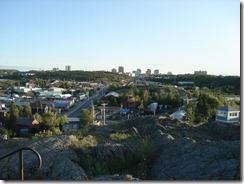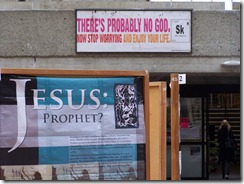Before I get to the crux of my commentary on this week’s Peak (which I have no article in for the first time in over a month since I didn’t get to submitting anything last week) – particularly Kate Scholz’s article “to tell the Truth”, I’ll copy here the positive TXT MSGS that appeared this week (all verbatim):
Buddha never claimed to be a god. Nor did jesus. Only ignorant forgets to say there is probably no god.
Re: Person wondering why nobody is bashing on buddhists are not tempermental pricks 
Singled out? It’s one poster. There are a half-dozen Christian groups on campus. I’m tired of ignorant people confusing their paranoia for persecution.
‘ignorany ppl bashing christianity?’ the poster is merely saying that you dont need to believe in and kind of mage-up god. You made the connection to a specific religion. Hmmm…
Also, you can read Graham Templeton’s article about how atheists are stereotyped in television shows. He makes a few points but overlooks (arguably) positive atheist/skeptic TV characters like Brian from Family Guy. Regardless, it’s better to have some representation, especially among somewhat likable lead characters like House and Patrick Jane, than none.
But the main article that needs addressing is Scholz’s last word feature on the supposed polarization between Christian and atheist groups on campus. The article doesn’t actually seem to be in plain text on The Peak’s website, but you can find it on the last page of the pdf edition.
Basically, Scholz has a few arguments, with some targeted at my two atheist pieces. First, she argues that atheists are throwing a continual “hissy fit” and
…skeptics and anti-religious on principle are just as dogmatic, and that the natural sciences have no exclusive grip on truth and knowledge – the arts faculties, including Religious Studies, exist to fill that gap. Refusing to acknowledge any common ground is just naive and annoying rather than intellectual or persuasive.
She then goes on to point out that science has pushed back a lot of ignorance that religion perpetuated. She further is “astounded” by the fact that creationism calls for equal time with evolution and admits that biology only makes sense in terms of evolution (the whole point of my first article).
So I have no clue what the first two-thirds of her article does expect lambast me for saying exactly what she was saying, but for putting in stronger terms. Hell, go back and read my anti-creationist article. I’ll wait.
…
Did you finish it?
…
Did you see where I said religion is stupid or Christians are harming the world by pushing their creationism? And the point where I said all knowledge only comes from science?
No? Perhaps because I didn’t say that. In fact, what I actually said was:
Science class is the place to develop the tools to view the world methodically and skeptically. Science asserts that evidence is required before we can decide whether an idea has any merit to it.
…
There are countless Christians and theists who have no difficulty with evolution. In fact, they are likely in the majority. A small minority, however, remains committed that the only way they can reconcile their belief in a vengeful Old Testament God is to deny the fundamental basis of all modern biology.
I argued from secularism, the idea that no religion or non-religion should be state-forced, that creationism has no place in science classes.
Next, Scholz devotes a paragraph to responding to the “There’s Probably No God…” banner and states:
Inflammatory remarks, absurdity, and turning one’s back are not the only responses to the creationist and missionary challenge that religious clubs pose to more secular members of society. What about compassionate reasoning and persuasion?
Wait, I said the only ways to deal with religious clubs are burns, jokes and ignoring them? I thought that what I said was:
This banner serves as a response to the countless religious clubs who are pervasive at this school and in society. It seeks to counter the notion that you cannot be good without God.
Alternatively, when your ideological adversaries are increasingly vulgar, sometimes the proper response is ridicule. My favourite counter-protests to Fred “God Hates Fags” Phelps’s picketing of funerals are the ones with absurdist signs
…
The only other approach to take with such content is to simply ignore it.
Perhaps it wasn’t clear that those last two options (absurdity and ignoring them) are in direct response only to those who’ve already tuned out reason and are instead just being assholes. If it wasn’t clear that I support dialogue with reasonable religious groups, than I apologize, let’s get together and sing kumbaya. Or at least have respectful discussions.
But wait, I do think that I said something like (because I did) “The proper response to a message that you disagree with is dialogue” or “Most of us come to university with an open-mind, ready to learn new things and hear different ideas.” Which seems to convey support for dialogue like Scholz calls for.
She also needs a dictionary, since she repeatedly calls the Skeptics “dogmatic,” which would be difficult for us to be since to be dogmatic, one would need dogma, or an “established belief or doctrine.” And I’m not sure that Demon Haunted World or God Delusion count as holy books.
Finally, Scholz mentions that she is an unbeliever (in God), but I think I have to classify her as an “Ivory Tower Atheist.” I’m not sure if this term has really been used before, but it does follow alongside the accommodationist idea that PZ Myers has specifically advocated against. I propose that at least some of the following characteristics apply to the Ivory Tower Atheist:
- Believes in belief
This phrase is borrowed from Daniel Dennett and is emphasized in his book, Breaking the Spell. The idea is someone who may or may not believe in God, but sees some value for those who do believe. Perhaps it makes them happier or provides them some solace.
A read through any of the New Atheists books (Dawkins, Dennett, Harris or Hitchens) will provide several debunking of this argument, among them are the support of often immoral institutions and the danger of greater credulity of believing something without evidece.
- Is against organized atheism
Often they see no reason for non-religious to organize, and criticize those who do organize of making atheism into a religion. This however is to deny the very social nature of our species (which becomes especially important for minority groups) and the desire of many to resist growing extremism in religion.
- Sees belief as something unnecessary for the educated, but useful for the rest
This goes along with belief in belief, but furthers it to suggest in an elitist way that atheism is too intellectual for the simpletons, but we wise intellectuals can understand that this is how the world works. This is a very anti-humanistic view that is at least class discrimination if not in some cases racism or otherwise.
- Thinks atheists ought to keep quiet
They agree with religions that criticism of religion ought to be banned or kept down, since offending people is not a civil thing to do. Meanwhile they seem to ignore the fact that the Pope and countless religions call atheists the scum of the Earth and the reason that evil perpetuates (although to be fair sometimes its homosexuals or other faiths).
- May be “spiritual but not religious”
This tends to be used as a holier-than-thou sort of response that spiritualism is positive while religion is negative. Meanwhile, spirituality is either a very nebulous term meaning anything from Carl Sagan’s love of the universe to sorcery and witchcraft.
- Sees educated, liberal religions as the norm as opposed to fundamentalists
Often they fail to realize that a lot of homophobic, end-times Christians still exist, and are very powerful in this country right now. They may have theologian friends who confirm this bias, and it tilts their view of religion to be one that is progressive and accepting as opposed to fire and brimstone.
- Has never been to an atheist meeting
The most common response of critics in print and otherwise to atheist groups when they finally meet us in person is how nice we actually are. I’m not sure if they think we should be breathing fire or something, but perhaps actually seeing what we’re about and not trying to base your entire view of our club on our cheeky and provocative advertisements (that are working since they got your attention), would be a way for you to practice the dialogue that you preach. At the very least, check out our website which hosts a forum and tons of other ways you can contribute.
So that’s my rant of the night. I’m not totally sure how to combat these misconceptions beyond working harder to get these people to try to come out and meet some of the nice people who attend our meetings.
Regardless, I’m still trying to decide how much I’ll contribute to The Peak this summer since it’ll be running weekly but with a very small audience. At least the rumour is that the GSS may have failed the Peak funding referendum that was leaning toward ending funding but lacked quorum. In other words I may still be giving $4 per term in the fall and allowed to write for the paper.




